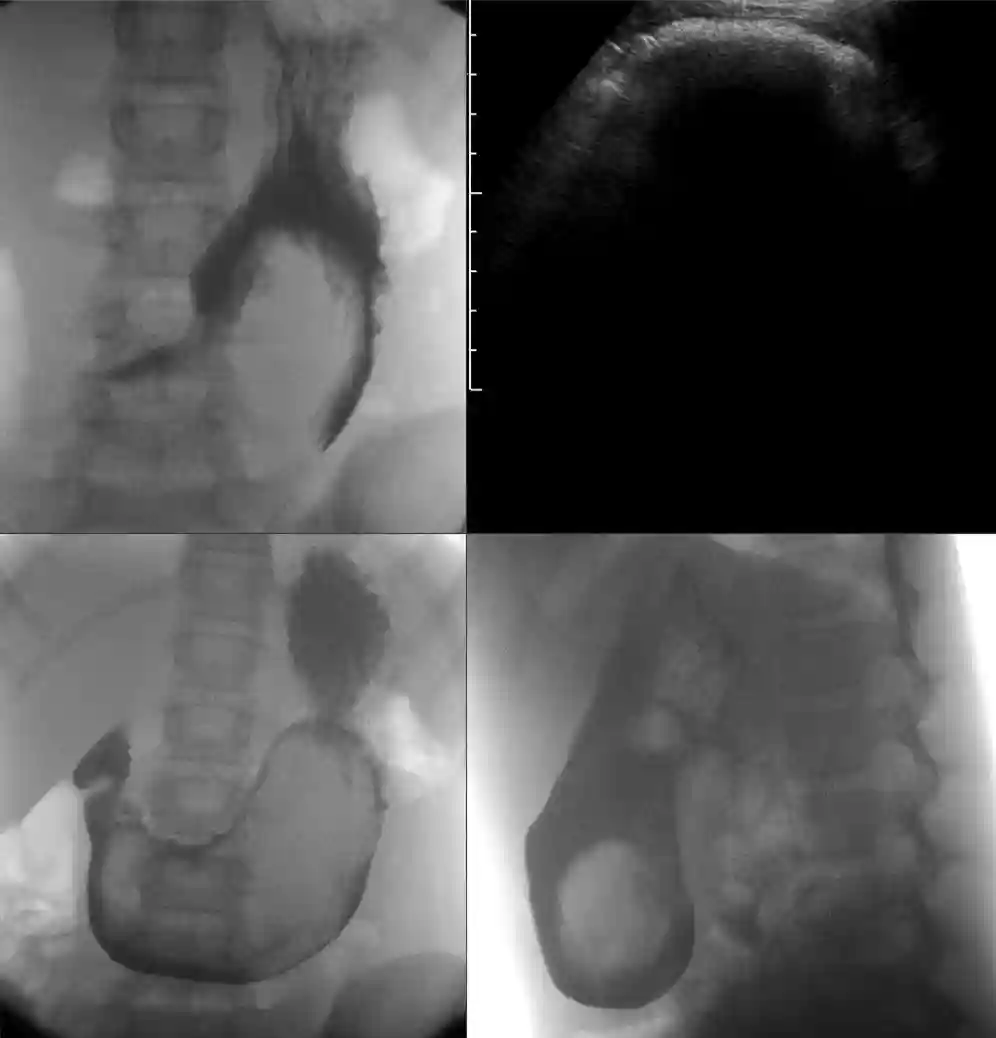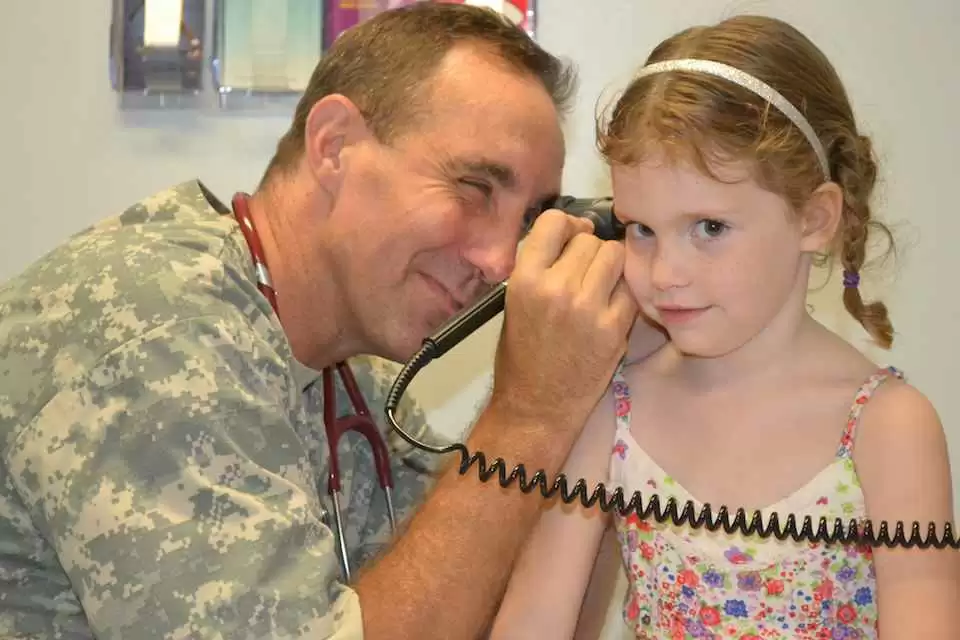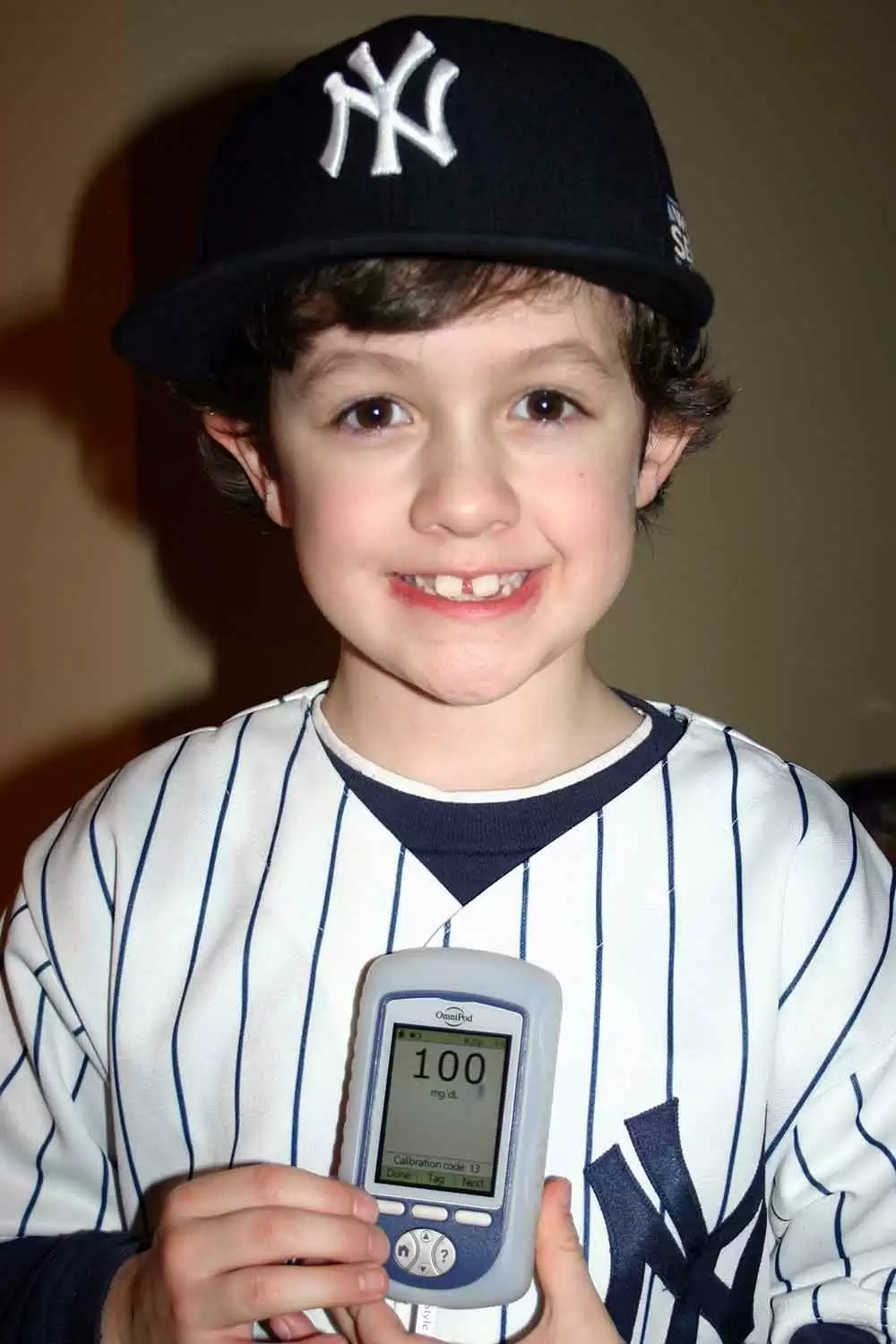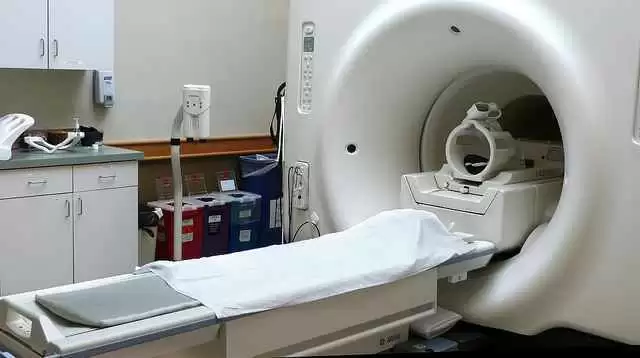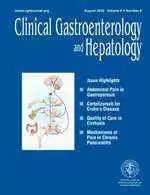-
Welcome to Celiac.com!
You have found your celiac tribe! Join us and ask questions in our forum, share your story, and connect with others.
-
Celiac.com Sponsor (A1):
Celiac.com Sponsor (A1-M):
-
Get Celiac.com Updates:Support Celiac.com!
Search the Community
Showing results for tags 'undiagnosed'.
-
Celiac.com 03/13/2024 - Trichobezoar may sound like a term from a medical textbook, but for some individuals, it's a real and challenging condition. Imagine a solid mass forming in your stomach, composed of hair and food debris. This unusual condition, known as trichobezoar, is exceptionally rare, particularly in children. However, a recent case study has shed light on a unique connection between trichobezoar and celiac disease, emphasizing the importance of understanding these conditions and their treatment. A team of researchers present an unusual case involving the discovery of gastric trichobezoar in a 15-year-old girl who had undiagnosed celiac disease. The condition manifested after she experienced abdominal pain and pallor. Trichobezoar typically occurs in less than 1% of children, with most cases observed in young girls with psychiatric disorders. The condition arises from a compulsion to pull out hair (trichotillomania) and ingest it (trichophagia), leading to the accumulation of hair within the stomach lining. While trichobezoar is often associated with psychiatric conditions, its link to celiac disease is less common but noteworthy. In a recent case study, a 15-year-old girl presented with symptoms of trichobezoar, including abdominal pain, vomiting, and unexplained weight loss. Upon examination, doctors discovered a firm mass in her abdomen, along with signs of hair loss on her scalp. What made this case unique was the subsequent diagnosis of celiac disease, a condition characterized by an adverse reaction to gluten. Celiac disease is a chronic autoimmune disorder triggered by the ingestion of gluten, a protein found in wheat, barley, and rye. While the association between trichobezoar and celiac disease is unusual, researchers suggest two possible explanations. Firstly, deficiencies in iron and folic acid, common in individuals with celiac disease, may lead to behavioral disorders such as trichophagia. Secondly, celiac disease itself may directly contribute to the development of trichobezoar. Treatment for trichobezoar typically involves surgical removal of the mass, followed by psychological support to prevent recurrence. In cases associated with celiac disease, adopting a gluten-free diet is essential to manage symptoms and promote healing. This comprehensive approach addresses both the physical and psychological aspects of the condition, offering patients a chance at improved health and well-being. While trichobezoar and celiac disease are relatively rare on their own, their coexistence presents a unique challenge for patients and healthcare providers alike. By raising awareness of this uncommon association and emphasizing the importance of early detection and treatment, we can better support individuals living with these conditions. As medical research continues to advance, we hope to gain further insights into the complex relationship between trichobezoar, celiac disease, and other related disorders, ultimately improving outcomes for those affected. Read more at cureus.com The research team included Hassnae Tkak, Amal Hamami, Aziza Elouali, Nadir Miry, Amal Bennani, Houssain Benhaddou, Abdeladim Babakhouya, and Maria Rkain. They are variously affiliated with the Department of Pediatrics, University Hospital Mohamed V, Faculty of Medecine and Pharmacy, University Mohamed first, Oujda, MAR; the Department of Pediatrics, Mohammed VI University Hospital, Oujda, MAR; the Faculty of medicine and pharmacy of Oujda, Mohammed I University of Oujda, Morocco; Oujda, MAR; the Pathology department, Mohammed VI University Hospital; Oujda, MAR; the Histopathology department, Faculty of Medicine and Pharmacy, Oujda, MAR; the Department of Pediatric Surgery, Mohammed VI University Hospital, Oujda, MAR; the Service de Pédiatrie, CHU Mohammed VI, Oujda, Maroc. , Faculté de médecine et de pharmacie d'Oujda, Université Mohammed I d'Oujda, Maroc., CHU Mohammed Vi Oujda Morocco, Oujda, MAR; the Department of Pediatrics, Mohammed VI university hospital, Oujda, Morocco., Faculty of medicine and pharmacy of Oujda, Mohammed I University of Oujda, Morocco, Oujda, MAR; and the Pediatric Gastroenterology, CHU Mohammed Vi Oujda Morocco, Oujda, MAR.
-
- celiac disease
- connection
-
(and 3 more)
Tagged with:
-
Celiac.com 03/30/2022 - I am the mother of two teenage children—both recently diagnosed with celiac disease. I manage an International Student Exchange program based in New Jersey. My hobbies include writing fiction and painting and I hold a black belt in Karate. Do I have celiac disease? I believe so. As a matter of fact I made myself very sick trying to prove it. What can I say? I was desperate! I spent the past twenty-five years doing everything the doctors told me and I was getting sicker instead of better. All I concentrated on was eating healthy and doing anything that promised to settle my stomach. Nothing worked. Whenever I complained to a doctor they would run a few tests and tell me that I probably had irritable bowel syndrome (IBS). Their advice was to lose weight and watch what I eat—easy for them to say! Since it wasn’t the in bed, out of work, desperately ill kind of sick at that point, I did my best to manage daily life. For the most part my family understood I had a “sensitive stomach” and learned to live with it—but I knew it was slowly getting worse and I was getting scared. Finally, I came to the point where I would just break down and pray to God, “I don’t care what it is, just give me an answer. Any answer!” When I first explained to doctors that I seemed to always be in the bathroom with severe nausea, stomach cramps, gas, and bloating they would say: “Must be something you ate.” To which, I’d answer, “Everyday?” and they would just shrug their shoulders. It wasn’t like I was dying, losing vast amounts of weight, or exhibiting symptoms that would raise the red flag—but I was in pain and embarrassed. I don’t think the doctors realized what it took for me to come forward with my complaints. As before, I left the doctor’s office without any answers and went on with my life, managing it as best as I could. One minute I could feel fine and the next I would be overcome with cramps. Some days I could barely manage to leave the house. It got so bad I would just not eat as I tried to “shut down” the digestive process. Doctors kept saying IBS. Frankly, I didn’t think that was much of a diagnosis. I mean, I already knew my bowels were irritated! What causes it? What can I do about it? I was told over and over again, “everyone gets it.” Watch what you eat, avoid junk food, alcohol, etc. Yeah right, I’d been trying that for years and it didn’t work. One day I’d eat something and be fine, the next day I’d eat the same thing and get sick. What did that tell me? I’d keep food diaries, take vitamins— even those made me nauseous— but I wasn’t feeling any better. Finally, I resigned myself to carrying a pack of Imodium in my purse wherever I went. It was so bad that everything I ate caused pain. If I had to do any traveling I would just not eat the day before or the day of the trip. Everywhere I went I just resigned myself to not eating. Once I got home and felt safe I would be so hungry that I would stuff everything I could find into my mouth. Of course, that would make me as sick as a dog. My biggest question was why could I eat something one day and be fine, then eat it a week later and be extremely sick? The medical community answered with “It’s IBS.” I know the real answer now. It’s because different brand names use different ingredients. One burger restaurant may add wheat, the other might not. Though the years I developed other problems. Lethargy made me go back to the doctor for blood tests, and I was diagnosed with hypothyroid. The medication for this gave me more energy but did nothing for my IBS. Scourge of my life. When I complained about having rough, blister-like breakouts on the back of my legs and arms I was told it was either eczema or “winter dry skin.” The recommendation was to use moisturizer and someone even told me to take vitamin E. None of this healed my skin but it did ease the breakouts a bit. Since the IBS was an even bigger problem, I pushed these other stressful problems to the back of my mind and tried to find foods that I could eat. At that point everything made me sick. I again mentioned the problems with my stomach during one of my normal thyroid checkups, and the fact that even a plain old slice of bread made me nauseous. “How could that be?” I cried. “Bread was what you give to sick people!” The doctor stopped and looked at me for a moment, then told me about his mother who had celiac disease. He told me I probably didn’t have it because of my weight—5 foot 6 inches and 160 pounds—because “people with celiac disease are very thin,” a belief that I later found out was incorrect. When I pressed him for more information he wrote down the name and told me to look it up on the Internet, but he still doubted that I had it. At this point in my life I was desperate for an answer and I prayed to God everyday that he would send me a clue as to what was tormenting me. Could this be it? I logged onto my computer the first chance I got and started reading everything I could find on this disease. I started looking into how many things in our everyday life contain gluten—breads, cereals, pastas, pizzas, and cakes were the obvious sources, but I was soon to learn that gluten is also mixed into many other processed foods. I immediately started a quest to get gluten out of my diet—which was a lot harder than I ever imagined. As much as ninety percent of the soups, canned foods, and prepared foods on the market today contain gluten. It is also used in certain medicines, sauces, spices, cough drops, stamps, and even envelope glue! For a while it seemed like everything I looked at had gluten in it. Another issue was cross-contamination. I needed to thoroughly clean those things which could be contaminated with gluten, including: toasters, cutting boards, pans, and plastic spatulas! It was incredibly depressing—yet the more research I did the easier it got. People with celiac disease can live normal, healthy lives, and I found a lot of support on the Internet. There, people from all over the world join together to share hints, problems, and commiserate. It made the transition much easier. I also went to my local health food store with a printout from a company that makes gluten-free foods, and they ordered some of them and now stock a wide variety of gluten-free products. I’m finding gluten-free pastas, breads, and even some cookies that are so good most people wouldn’t know that they were not made from wheat flour. There are also several good mail order bakeries that have good breads, bagels, and other products made from rice, tapioca or potato flour. I order online in quantity and freeze them. It definitely gets easier as time goes on. Within a month on a gluten-free diet my “IBS” and stomach cramps were gone! The nausea took a bit longer to improve but each day it improved. When I returned to the doctor and shared that I believed that I had celiac disease he was doubtful. At my insistence he ordered the blood test. At that point I had been off of gluten for about six to eight weeks. The test was negative. By this time I had met other people with celiac disease through the Internet who informed me that the tests would not be accurate unless I had been eating gluten daily for at least six prior to the test. I verified this information online and found it to be correct. My dilemma now was whether or not to go back on gluten for an accurate diagnosis. It was a hard decision. I have two daughters and I felt I needed to know since this can also be hereditary. My father suffered for years with gastrointestinal problems before dying at age 65 of colon cancer. I’m sure now that he had celiac disease. With all of this hanging over my head I decided to go back on gluten to get a definitive answer. My first meal was a pizza! Yum! The next day I was fine. So I continued to eat gluten. Within two days the cramps and diarrhea were back. By two weeks I was sick everyday and having trouble getting myself to work, but I didn’t give up. My husband thought I was crazy. He kept telling me that I already knew what was making me sick—so why was I doing this to myself? But I had already made the decision to find out if I really had celiac disease—so on I ate. On really bad days I took Imodium and sometimes didn’t eat until I was at home. The nausea was constant. Some days the cramping and pain were so bad that I just couldn’t eat at all. I don’t know if this hurt my test results or not but there were times when I just couldn’t bring myself to swallow any food at all. Eating caused the pain to worsen. This continued for six weeks! On the day of my blood test I did not eat before I went to the lab at two in the afternoon. I was afraid that if I ate anything at all I’d get sick at the lab and that would be too embarrassing. Have you ever sat in a room full of people waiting for your turn—fighting nausea and just knowing that everyone in there was watching every time you got up to use the bathroom—five times in a row?! Let alone having to sit still long enough to get the blood drawn. The blood work all came back negative. At this point I dragged in my sixteen-year-old daughter for a blood test. The doctor thought that I was crazy. She didn’t fit the profile. I asked him to do it anyway to put my mind at ease—so he did. The blood work was positive. After that my nineteen-year-old daughter tested positive as well. Both of them opted out of the endoscopes, even though this is thought to be the gold standard for diagnosis. They went gluten-free and both are feeling much better on the diet. Two weeks later I went for my endoscopy. I asked the gastroenterologist how many biopsies he was planning to take and he told me: “Enough, don’t worry.” But I did worry. What if it’s not enough? Celiac damage can be patchy and I desperately wanted an accurate diagnosis. The doctor called two days later and said the biopsy was fine. So I am an undiagnosed celiac. I went gluten-free the day of my endoscopy and today I am feeling better than I have in my whole life! The “IBS” is gone, my skin is clearing and I never get nauseous. Today I feel healthy and I am living a much better life. Traveling still makes me nervous but it’s getting easier as I learn to trust my body once again. Would my tests have been positive if I had been tested before going gluten-free? I don’t know and at this point I don’t care. I know what makes me sick and I avoid it. It’s as simple as that. I only wish I had understood that before going on the gluten challenge as it would have saved me a lot of pain. My biggest problem now is when people say things like, “Oh, I couldn’t live without pasta!” Would they say to a diabetic: “I couldn’t live without sugar”? I hope not. To these people I just say: “You could if it made you sick.” I also thank God everyday for the answer I prayed for so often: celiac disease. It’s a different way of life that takes some getting used to, but it is quite do-able. Pizza never tasted as good as being healthy feels! ©A Personal Touch Publishing, LLC. This article originally appeared in the book A Personal Touch On...™ Celiac Disease.
- 10 comments
-
- bloating
- celiac disease
-
(and 5 more)
Tagged with:
-
Celiac.com 07/21/2016 - Celiac disease is a condition that can sometimes have vague symptoms, including mental and neurological symptoms, and that can make it hard to diagnose. Sometimes, individual cases can help to shed light on the serious nature of celiac disease, as well as the importance of a gluten-free diet in treatment. Consider the case of a 37-year-old Ph.D. candidate began to suffer from mysterious delusions, details of which appear in The New England Journal of Medicine. The doctors who treated her wrote that the woman, who was otherwise healthy and seemingly normal, had begun to believe that friends, family members and even strangers were conspiring to act out scenes for her in a what the woman thought was some kind of "game." The delusions got so bad that the woman began making threats against her family, and was admitted to a psychiatric hospital and was diagnosed with a psychotic disorder, according to the report. The doctors prescribed anti-psychotic medications, which, they wrote, did not work very well. However, during her stay, they did notice that she had several vitamin and mineral deficiencies, had lost a lot of weight and also had thyroid problems, according to the report. Noting the symptoms, the doctors began to suspect celiac disease, said Dr. Alessio Fasano, director of the Center for Celiac Research and Treatment at Massachusetts General Hospital in Boston and one of the doctors who treated the woman. When the doctors confirmed celiac disease, the woman refused to go on a gluten-free diet, because she was still suffering delusions and believed the doctors to be actively deceiving her about having celiac disease. In this case, the woman lost her job, became homeless and even attempted suicide before she was finally re-hospitalized at a psychiatric facility, where she was successfully placed on a gluten-free diet, where she improved tremendously. She came to understand that a reaction to gluten had triggered her symptoms and caused her life to spin out of control, said Dr. Fasano, and she wanted people to understand that her strange behavior was due to the gluten reaction. The woman's case is not typical, to be sure, but it highlights the sometimes sneaky ways celiac disease can manifest, the serious health impacts celiac disease can have, and the importance of adopting a gluten-free diet. Source: Livescience.com.
- 3 comments
-
Celiac.com 01/27/2021 - The effects of celiac disease are typically gastrointestinal, though there have been rare cases where celiac disease can manifest with psychiatric symptoms and behavioral disturbances. In one recent case, a woman with untreated celiac disease experienced psychotic delusions when eating gluten. The delusions left her isolated from family and friends, and led to psychiatric treatment, diagnosis of celiac disease, and adoption of a gluten-free diet. After improving, accidental gluten consumption caused another break that led to a homicide attempt on her parents. In an unrelated matter, a team of researchers recently reported on the case of a 25-year-old man with a history of schizophrenia and autism spectrum disorder who was seen for behavioral disturbance after breaking into a neighboring house to eat food. The research team included Andrew K. Murphy, Joseph A. Norton, and Benjamin R. Pflederer. They are affiliated with the Department of Medicine at the University of Illinois College of Medicine in Peoria, Illinois. The male patient reported several months of diarrhea and fecal incontinence, and was severely malnourished on exam, despite eating sufficient food. These days, with better celiac awareness and testing, it's uncommon for patients to present with celiac crisis, which is marked by profuse diarrhea and severe metabolic/nutritional disturbances. Interestingly, behavioral disturbances, such as increased aggression or anxiety, are often the main manifestation of celiac disease in children, with gastrointestinal symptoms being milder or absent. A blood screen showed high tissue transglutaminase IgA antibody (TTG) and gliadin IgA levels, and celiac disease was confirmed by biopsy. The patient began a lactose-free and gluten-free diet, and received a short course of total parenteral nutrition (TPN) for nutritional resuscitation. He improved rapidly with this treatment, and his nutrition and behavior returned to baseline. This report of a case in which an adult with psychiatric comorbidities manifesting mainly as behavioral disturbances more common in children. Such patients can show highly atypical symptoms, and clinicians should watch carefully for such cases. Read more at: Am J Case Rep 2020; 21:e928337
- 1 comment
-
- autism
- behavioral
- (and 7 more)
-
Celiac.com 03/28/2014 - Did John F. Kennedy suffer from symptoms of undiagnosed celiac disease? Celiac disease expert Dr. Peter H. R. Green says Kennedy's known symptoms and family history make it likely that America's 35th president did in fact have celiac disease, which remained undetected in his lifetime. Dr. Green is the director of the Celiac Disease Center at Columbia University, professor of clinical medicine at the College of Physicians and Surgeons, Columbia University and attending physician at the Columbia University Medical Center. He writes that: “John F. Kennedy’s long-standing medical problems started in childhood. In Kennedy’s adolescence, gastrointestinal symptoms, weight and growth problems as well as fatigue were described. Later in life, he suffered from abdominal pain, diarrhea, weight loss, osteoporosis, migraine and Addison’s disease. Chronic back problems, due to osteoporosis, resulted in several operations and required medications for chronic pain." Greene adds that Kennedy’s Irish heritage, history of gastrointestinal complaints since childhood, diagnosis of irritable bowel syndrome and migraine, presence of severe osteoporosis, and the development of Addison’s disease all point to celiac disease. Kennedy was given steroids for his problems. Steroid use is associated with the development of osteoporosis and Addison’s disease. The occurrence of Addison’s disease in his sister, however, argues for a familial [genetic] cause of his Addison’s disease, rather than an iatrogenic one. Source: Irishcentral.com.
- 3 comments
-
- celiac
- celiac disease
-
(and 5 more)
Tagged with:
-
Celiac.com 10/28/2019 - Among other things, a recent study on nutrition and bone health in adults with probable undiagnosed, untreated celiac disease drives home the importance of early diagnosis and quick adoption of a gluten-free diet. The importance can be seen in the findings of a research team that recently looked at variations in nutritional intake of calcium, vitamin D, and phosphorus; their levels in the blood; and bone health in adults with and without likely, undiagnosed celiac disease. The research team included Lara H. Sattgast, Sina Gallo, Cara L. Frankenfeld, Alanna J. Moshfegh, and Margaret Slavin. They are variously affiliated with the Department of Nutrition & Food Studies, George Mason University, Fairfax, Virginia, USA; the Department of Global & Community Health, George Mason University, Fairfax, Virginia, USA; and the Food Survey celiac diseases Research Group, Agricultural Research Service, U.S. Department of Agriculture, Beltsville, Maryland, USA. The team analyzed data from 48 adults with likely undiagnosed celiac disease and positive immunoglobulin A endomysial antibody tests, and 13,634 controls. The data came from What We Eat in America and the National Health and Nutrition Examination Survey 2009–2014, and included self-reported information on dietary and supplement intake from a single day of 24-hour recalls, serologic indicators, and dual x-ray absorptiometry images. The team's statistical analysis included multiple linear regression modeling controlled for age, sex, race/ethnicity, energy intake, and poverty income ratio. Rates of likely undiagnosed celiac disease were 1 in 285. Patients with likely celiac disease showed an average 251.6 mg higher daily total calcium intake, higher dairy consumption by 0.7 cups per day, and higher serum phosphorus levels. Probable celiac patients showed a substantially higher total dietary and supplement intake measured in calcium density and phosphorus density. The researchers saw no differences in serum calcium, vitamin D, or alkaline phosphatase levels between the groups. Patients with likely celiac disease were associated with lower femur bone mineral density (BMD) and a lower femoral neck BMD, but showed no difference in total spine BMD. This is one of the first studies to examine variations in nutritional intake of calcium, vitamin D, and phosphorus; their levels in the blood; and bone health in adults with and without likely, undiagnosed celiac disease. Adults with probable undiagnosed celiac disease had lower bone density than those without celiac disease, even though they reported higher calcium intake and nutritional density of calcium and phosphorus. Among other things, the variations in BMD in this study demonstrate the importance of early diagnosis and the rapid adoption of a gluten-free diet for patients with undiagnosed celiac disease. Read more in the J Am Coll Nutr. 2019 Jul 19:1-10.
- 1 comment
-
- adult
- bone health
-
(and 7 more)
Tagged with:
-
Celiac.com 10/20/2017 - Are doctors even getting close to diagnosing the actual number of cases of celiac disease? Or are they missing the vast majority? Researchers have said for some time that there are far more people with celiac disease than are being diagnosed, and that the vast majority of cases go undiagnosed. So, just how far are we from the actual number? Well, if a new study by Canadian nutrition researchers is any indication, doctors are very far from diagnosing most cases. The team studied the blood work of nearly 3,000 people, and their conclusions are stunning. They say that ninety percent of celiac cases go undiagnosed. How could this be? One reason is that even classic celiac disease symptom, such as abdominal pain, bloating, gas, diarrhea, anemia and weight loss can mimic other conditions. Less classic symptoms such as fatigue, low vitamin C, D and calcium levels can be misleading. Ahmed El-Sohemy, a professor of nutritional science at the University of Toronto, wanted to see whether celiac disease results in subpar nutrition because of poorer absorption of vitamins and minerals. But to find out, he needed Canadian data on the frequency of undiagnosed celiac disease. To that end, El-Sohemy and his colleagues checked blood samples from more than 2,800 individuals in Toronto. One group had an average age of 23, and the other 45. Among their findings is likely ~1%, with 87% of cases being undiagnosed. These findings suggest the need for better screening in high genetic risk groups. Source: BMJOPEN.com
-
I saw a gastroenterologist for the first time yesterday, after being gluten free since November. She said all of my symptoms (before November) were consistent with celiac. She ordered the genetic blood test, and I’ll also have an endoscopy (in case there is still damage in small intestine and to rule out anything else going on) and a colonoscopy (dad passed away from colon cancer in 2015)) in a week and a half. She explained and I am aware that I will probably not get an official diagnosis since I have been gluten free for months. She said the only way to get an official diagnosis would be do to the gluten challenge, and she doesn’t suggest it because it would be bad for my health. Anyway, this rash on my thigh has popped up and I’m wondering if it could possibly be DH. I don’t want to go to dermatologist if it’s definitely not, thoughts? I guess I should say even though I have been gluten-free since November, I have accidentally been glutened several times since then. The most recent being about a week ago. Thanks in advance for any input - this forum has been so helpful.
- 2 replies
-
- dh
- gluten free
-
(and 1 more)
Tagged with:
-
Celiac.com 03/01/2019 - About 30,000 new cases of type 1 diabetes are diagnosed annually in the US, typically in children. If a serious disease affected up to 10% of all type 1 diabetics, wouldn’t you agree that it’s time to sit up and take notice? Perhaps screening for this disease would also make sense. Celiac disease affects 1% of the population, making it a common disease. In the celiac population there is an increased prevalence of type 1 diabetes and this association is well established. Despite celiac disease affecting a much greater percentage of the general population than type 1 diabetes, 90% of the patients suffering from both conditions are first diagnosed with diabetes.[1] Study results vary, but the prevalence of celiac disease among children with diabetes ranges between 4.5% (over 25 studies),[2] to 10%[3] and 12.3%[4] respectively. Opinions on whether screening of all diabetic patients should become part of the medical model are controversial, but fortunately, we are seeing increased support [5,6,9]. It is difficult to overestimate the stress associated with the diagnosis of a severe illness in a child. And perhaps the last thing that a parent wishes to hear is that a second severe illness may be involved. I understand that. But consider the fact that both type 1 diabetes and celiac disease are autoimmune diseases. When a patient has one autoimmune disease they are much more likely to develop another. And obviously the greater the number of such conditions that affect a single individual, the lower their vitality and life expectancy are likely to be. I would recommend to any parent of a child with type 1 diabetes, as well as any adult with the disease, that they get tested for both celiac disease and gluten sensitivity as soon as possible. In my clinical experience we have seen excellent changes when a gluten-free diet was implemented. The facts are these: when celiac disease is diagnosed in diabetics it often occurs within a couple of years of the diabetes diagnosis, but after 5 years the cumulative numbers revealed an estimated 10% incidence of celiac.[3] This is just too common to ignore and the ill effects it creates in these individuals can be dramatic. While it may seem overwhelming to consider, in the long run it could mean the difference between a stable health condition and life-long health challenges. Please let me know if I can be of any assistance. I am here to help. Sources: Ludvigsson JF, “Celiac disease and risk of subsequent Type 1 diabetes” Diabetes Care 29(11), 2483–2488 (2006). Holmes GK. “Screening for coeliac disease in Type 1 diabetes”. Archives of Disease in Childhood. 87(6), 495–498 (2002). Larsson K, et al. “Annual screening detects celiac disease in children with Type 1 diabetes”. Pediatric Diabetes 9(4 Pt 2), 354–359 (2008). Hansen D, et al. “Clinical benefit of a gluten-free diet in Type 1 diabetic children with screening-detected celiac disease” Diabetes Care 29(11), 2452–2456 (2006). Holmes GK. “Coeliac disease and Type 1 diabetes mellitus – the case for screening”. Diabetic Medicine 18(3), 169–177 (2001). Narula P, et al. “Gastrointestinal symptoms in children with Type 1 diabetes screened for celiac disease”. Pediatrics 124(3), E489–E495 (2009). Sanchez-Albisua. “Celiac disease in children with Type 1 diabetes mellitus: the effect of the gluten-free diet. Diabetic Medicine 22(8), 1079–1082 (2005). Goh C. “Prevalence of coeliac disease in children and adolescents with Type 1 diabetes mellitus in a clinic based population”. Postgraduate Medical Journal 83(976), 132–136 (2007). Frohlich-Reiterer EE, et al. “Screening frequency for celiac disease and autoimmune thyroiditis in children and adolescents with Type 1 diabetes mellitus” Pediatric Diabetes 9(6), 546–553 (2008).
-
- celiac
- celiac disease
-
(and 5 more)
Tagged with:
-
Hi, I have some questions that I hope to get some answers to. First of all, I am not diagnosed and have not been tested for celiac. Only bloodtest I have taken that's relevant is Ferritin and Iron. I'm not anemic, but both my levels are on the lower range of normal (Ferritin 20-25 and Iron 9 and Iron binding capacity a bit over the normal range). My first question is if this is normal in celiacs, or would the Ferritin and Iron be lower if I was celiac? I eat meat and vegetables and my periods are normal. Second Question is related to abdominal pain. I have these IBS related pains (cramping before going to the bathroom) sometimes and also some bloating and stuff. But sometimes I get this lower abdominal pain that is different, it's much much worse when I press my stomach in or touch it. It almost feel normal when I sit still in one position, but when i lean forward, touch it or press it in, it's really bad. Does anyone else with celiac relate to this kind of abdominal pain? The reason I'm asking these questions is because I'm wondering if I should get tested for celiac. I've had symptoms for a while now, and I want to suggest different blood tests to my doctor. I have a feeling I should get tested for something autoimmune. There are already three different Autoimmune diseases in my mother's family (grandmother with psoriasis, cousin with diabetes, mother with ulcerus colitis), and I've been having diffuse symptoms for a while now, like abdominal pain, diarrhea, muscle/bone pain, some joint pain, muscles falling asleep, some tingling, anxiety, neck pain, fever feeling without fever, chills, fatigue (especially after lunch), bad hangovers etc etc. The list is long. So I'm just trying to get some answers so I can be more clear with my doc. Thanks!
- 1 reply
-
- abdominal pain
- autoimmunity
-
(and 5 more)
Tagged with:
-
Celiac.com 07/02/2018 - We know from earlier studies that diagnosed celiac disease is more common in women than in men, but there isn’t much good data on sex-based differences in undiagnosed celiac disease. To address this discrepancy, Claire L. Jansson-Knodell, MD, and her colleagues at the Mayo Clinic, in Rochester, Minnesota, conducted a meta-analysis of studies that performed both a screening and confirmatory test that included either a second serological study or a small intestine biopsy, and that that provided clear and complete data regarding sex. According to data they presented at Digestive Disease Week 2018 in Washington, D.C., women are significantly more likely than men to have undiagnosed celiac disease, and the numbers are even higher for younger girls. In all, the researchers found 88 studies that met their inclusion criteria. These studies included data on nearly 300,000 patients. When they got done crunching the numbers, the research team demonstrated for the first time that women also had a higher rate of undetected celiac disease than men. When the team analyzed data from one subgroup focused on children, they found that rates of undiagnosed celiac disease were even higher in girls compared with boys. Timely diagnosis of celiac disease is important for preventing unnecessary suffering, and potential damage and disease associated with untreated celiac disease. In one recent case, a doctors found that a woman's psychotic delusions were caused by undiagnosed celiac disease and an adverse reaction to continued gluten exposure. Her condition improved quickly once she began a gluten-free diet. The research team says that their findings could change approaches to clinical screening, diagnosis and management of celiac disease. They also suggest that physicians might do well to increase their suspicion levels for celiac disease when evaluation women and girls. Source: Helio.com
- 1 comment
-
- biopsy
- blood test
-
(and 5 more)
Tagged with:
-
My entire life I've been dealing with what I now know is reactive hypoglycemia. I vividly remember eating a ton in the morning because I was scared of getting "woozy" and not having snacks prepared during elementary school. I also remember nearly passing out several times in P.E. class just two hours after lunch. Over the years I've managed it by having snacks and protein with each meal, but it's been getting more difficult as I've gotten older. My mom has the same thing and she gets woozy pretty often. She said her mother dealt with it, too. I thought this could be something related to diabetes, but after I posted on a diabetes forum, I had someone ask if I had been tested for gluten intolerance or thought about it. So, I'm bringing my symptoms here to see if any of this sounds like an intolerance. I am so tired of having digestive problems and I don't know what to do. Here are my other symptoms: *I have dealt with anorexia since I was 13 (currently 18), but I've been doing well for this past year, so new foods/normal amounts of food/eating out really shouldn't be bothering my stomach this much anymore. I've never experienced a regular period since I started starving myself soon after I first got it. When I was recovered the first time, before a relapse, I had a couple of irregular periods. Since my second recovery, I STILL have not regained my period. It has been over a year and my nutritionist seemed stumped. I have since stopped seeing her and am eating quite normally and freely as I used to and have gained weight recently just to see if that could help. Still nothing. In the mornings I'm usually very full, kind of nauseous, hot, and thirsty. I feel sick after eating a lot, or even "normal" amounts when I go out with friends. I have stomach cramps/sharp pains, extreme gas all day and everyday, suuuuuper bloated all the time, reflux, nausea, sometimes constipation, fatigue, my finger and toes often tingle, mouth ulcers, headaches...when I was younger I had "chicken skin" on the backs of my arms, which has since gone away. I also am diagnosed with anxiety. There's honestly more symptoms but I can't list them all. To sum it up, my stomach is upset all the time and I am always bloated no matter how long ago I ate/how nutritionally dense the food was. *forgot to mention, I'm also lactose intolerant, just like my mom. Any feedback is greatly appreciated.
-
Hello everyone! I am new here. I went to urgent care for nerve pain last week (hands and feet going numb, tingling, burning etc) My doctor did not want to see me and told me to go to urgent care. I thought the pain was caused from my back because I have a ton of back problems. Anyway, at urgent care the doctor asked if I have celiac disease. I said "No but my grandma does." she straight up said "you have it." no tests nothing, but she has it and said my symptoms reflect the disease. Anyways it makes sense to me and I think I might have it. I have a lot of symptoms and I would like others input. Here is a list: I am a 24 year old female. I am average weight and height. Migranes every day since I was 14. I had to get a cat scan after I fainted in class. They found nothing and put me on meds that didn't work. When I was 15 I had anemia. At 16 I was vitamin D deficient. I got blood work done a few months ago and no longer have anemia After that I had terrible anxiety and depression. Put me on meds that didn't work. Back problems for no reason (started when I was 18) herniated disk, multiple bulging disks, my disks are loosing fluid, scoliosis, Stomach problems, 2 years ago I started to feel nauseous every day, worse in the morning, I'd dry heave every morning or puke. Some days I'd puke up bile. This is still going on. They ran tests on my liver (high liver enzymes and fatty liver) and a gallbladder test, came back normal. I go poop 5-10 times a day. The stool is always loose. Once in awhile it is solid. Sometimes I go so much, when I wipe I start to bleed and it is painful. I have 3 breaks at work, I go before my break and right before it ends. Its embarrassing. So some days I go number two at work 6 times in one day! I always feel like I am on my period, I have skinny days where I can wear a size 9 but somedays for no reason I swell up and my size 11 pants are tight and hurt because my pelvic area is tender. I had an ultrasound, they found one cyst. A few months back I lost 15 pounds in two weeks, I could barely eat I felt so sick all the time. Then a few months later I gained 20 pounds in two weeks. I till wasn't eating. I went up multiple sizes and it just hurt. I never have an appetite. I started to get a random rash, my scalp itched, my knees and my elbows. It went away it was just weird. It lasted about a month and my doc said it was ecsema. Now I can't loose the weight. I am vegetarian, tried working out but can't loose anything. (by working out I mean walking. I literally don't have energy to do anything else) I get puffy eyes. Bad allergies, and sinus pressure every day of my life. On allergy meds that kinda help. I noticed a lot of these symptoms get worse after I eat gluten. I just started keeping track after the doctor mentioned this. I also have just been getting nerve pain, my arms and legs cramp up, my feet cramp up and get stuck, my hands and feet go numb, tingle, and BURN. I am tired all day every day even if I sleep 10 plus hours. Everyday I feel like I lifted weights and did full body work outs and everyday I feel hungover even though I did not drink any alcohol. I get tired from folding laundry and can barely function. All I want to do is lay in bed. Some days I drink 5 cups of coffee and an energy drink and I'm still tired. I also have brain fog and bad memory problems lately. I am messing up at work with the way I feel. I literally feel like my body is telling me something wrong. Sometimes my body aches so much I think I have fibro or (cancer) thats really how bad I feel. One day after my legs were cramping all day I had weird red patches all over my legs. I was freaked out. Any input would be great. Of course having celiac would suck but I feel so bad every day an answer to my problems would be amazing. I can't keep living like this. I noticed after I eat gluten, about an hour after, I feel depressed for no reason. Sometimes I cramp up and my stomach is tender. I don't know what to do.
- 17 replies
-
Hi everyone, I've recently got more details on my first blood test for celiac and my ALT levels were slightly higher than the normal threshold, 25 vs between 8-22. I've just had my second blood test and am waiting on the results but along with all the other usual celiac symptoms I've been having is this a good sign that I do indeed have celiac disease?
-
Hi everyone, I've had pale foul smelling stools for an extended period of time which can sometimes alternate between diarrhoea and constipation with very rarely some red/white spots in the stool along with lower abdominal pain and pain below my ribcage/lower sides which I'm terrified is to do with my lymph nodes. When I first went to my doctor he gave me some treatment for IBS and also got me in for a blood test. All my bloods came back normal apart from my liver which really freaked me out at the time and I have another blood test in a few days time. I have been gluten free for about 2 weeks, since my first blood test, and symptoms haven't stopped although gluten free food does seem to sit in my stomach easier and I have felt less fatigued upon going gluten free, though I did unknowingly eat some gluten last night and have had a very gassy stomach since. The symptoms can also be heavily exacerbated by alcohol however. I'm 18 years old having just started university in the UK and this things are getting to the point where I'm struggling to cope. My fears are also making me feel like I could have some kind of cancer or Crohn's disease and at 18 this is turning me into a complete wreck. Is it likely I have Coeliac or could it be something much worse? I'm starting to fear the worst!
-
Celiac.com 05/19/2017 - Did you know that now, according to Beyond Celiac 83% of those with celiac disease are misdiagnosed or undiagnosed? Did you know that the average time a person waits to be correctly diagnosed, according to Daniel Lefler, M.D., M.S, of the Celiac Center at Beth Israel Deaconness Medical Center is still six to 10 years? This has changed little in the past 10 years, even though celiac disease can lead to a number of other disorders including infertility, reduced bone density, neurological disorders, some cancers, and other autoimmune diseases. Over a four year period, people with undiagnosed celiac disease cost an average of $3,964 more than the healthy individuals (Source: Long et al, 2010. Did you know that 5 - 22% of people with celiac disease have an immediate family member (first degree relative who also has celiac disease, and that there isn't yet a pharmaceutical treatment or cure for it? In 2009 WebMD reported that, in the USA, celiac disease has quadrupled over the last 50 years, yet many people who have the disease remain undiagnosed. Still Dr. Stefano Guandalini, N.D. Director of the Celiac Disease Center at the University of Chicago told WebMD, "Many of these people have no symptoms, but many do have symptoms that are not recognized for what they are. We believe that only five percent of people with celiac disease know they have it". Is there any wonder that a woman at the dietician's office at our local hospital where I sometimes volunteer did not know she had celiac disease? This is because she was only experiencing symptoms of joint and muscle pains, abdominal pain and laboratory tests only showed anemia. She was first referred to an orthopedic specialist, then an internist, and neither checked for celiac disease or questioned her further. "Hello!!" Are there still general practitioners out there who are not aware that there is a blood test for celiac disease? Some people experience symptoms found in celiac disease such as a "brain fog," depression, ADHD like behavior, abdominal pain, bloating, diarrhea, constipation, headaches, bone or joint pain, and chronic fatigue when they have gluten in their diet, yet do not test positive for celiac disease. The terms non-celiac gluten sensitivity (NCGS) and non-celiac wheat sensitivity (NCWS) are generally used to refer to this condition. When removing gluten from their diet it removes symptoms. At my first biopsy of the bowel the gastroenterologist failed to biopsy the jejunum. My blood test was positive, the biopsy of the dermatitis herpetiformis proved positive too, and it wasn't until I insisted on a second biopsy of my jejunum that I was diagnosed. If I had not been persistent, I would have given up after the first biopsy and continued itching and ingesting gluten. Persistence, or stubborn determination (i.e. knowing my own body) paid off, but it took a year for the dermatitis herpetiformis to totally rescind, most particularly the sores on my scalp. You know your own body better than anyone; you know when something is wrong. If your grocery store fails to give you good service you go elsewhere. The Celiac Disease Foundation, both in Canada and the United States, can help you find the right doctor to discuss your symptoms so you can get diagnosed and treated. Shop and find your own healthcare practitioner. Do not allow a doctor tell you that you are neurotic, perimenopausal, or their favorite: "stressed." Since there are more than 200 known celiac disease symptoms which may occur in the digestive system or other parts of the body, and some people develop celiac disease as a child, others as an adult, you owe it to yourself to keep checking and researching and reading magazines like Celiac.com's Journal of Gluten Sensitivity, because, according to the Mayo Clinic, there is no cure for celiac disease. The American Journal of Gastroenterology, at ScienceDirect.com, offers a nationwide view of celiac disease, and conducted two randomized trials that tested strategies of early or delayed gluten introduction in infants, and neither strategy appeared to influence the risk for celiac disease. They also indicated that breastfeeding did not protect against celiac disease. "While disappointing, these results should spur the study of wider environmental risk factors beyond infant feeding, such as intrauterine and perinatal exposure as well as environmental influences later in life, including drug exposure, microbial infections, and the mictobionme. Given that celiac disease can develop at any age, it is imperative to study these proposed triggers so as to elucidate the loss of tolerance to gluten and to develop future intervention strategies." At the start of the Gastroenterology study, between 2000 and 2001 - 11.1 out of every 100,000 people had celiac disease. Toward the end of the study - between 2008 and 2010 it was up to 17.3 out of every 100,000 people. However, researchers noted that the incidence of celiac disease plateaued after 2004. It is no big surprise that they believe, according to Dr. Stefano Guandalini, M.D. "that only about 5 percent of people with celiac disease know they have it." Web MD reported that "Celiac Disease had quadrupled." Many physicians I approached whilst completing this survey indicated it was physician knowledge of the signs and symptoms of celiac disease that has caused a greater increase in celiac testing and the use of a simple blood test (tTG-IgA). The Tissue Transglutaminase Antibodies test will be positive in about 98% of patients with celiac disease who are on a gluten-containing diet. The same test will come back negative in about 98% of healthy people without celiac disease. Although rare, patients with celiac disease could have a negative antibody test result. There is also a slight risk of a false positive test result, especially for people with associated autoimmune disorders like Type 1 Diabetes, autoimmune liver disease, Hashimoto's thyroiditis, psoriatic or rheumatoid arthritis, and heart failure. This test is not good for someone who has been following a gluten-fre diet on their own. A biopsy of the small intestine is still considered the only way to diagnose celiac disease by many doctors. Many parents are reluctant to submit their young child to a biopsy of the Jejeunum and have used only blood tests, including the IgA Endomysial antibody (EMA). This test has a specificity of almost 100% but it is not as sensitive as the tTG-IGA test, because about 10% of people with celiac disease do not have a positive EMA test. Also, it is VERY expensive in comparison to the tTG-IgA and it requires the use of primate esophagus or human umbilical cord, so it is usually reserved for difficult to diagnose patients. The Total Serum IgA is used to test for IgA deficiency, a condition associated with celiac disease that can cause a false negative tTC-IgA or EMA result. If you are IgA deficient, our doctor can order a DGP or tTg-IgC. The decimated gliadin peptide (DGP-IgA and IgG) is a test that can be used to further screen for celiac disease in individuals with IgA deficiency or people who test negative for tTg or EMA antibodies. Even though it is very rare, it is possible for someone with celiac disease to have negative antibody test results. So please do not become discouraged even with negative results, if you are still experiencing symptoms talk with your physician and undergo further medical evaluation. Keep in mind that some of these tests are not medically covered by insurance. Did you know that you can get genetic testing for celiac disease? People with celiac disease carry one or both of the HLA DQ2 and DQ8 genes. So do up to 25 - 30% of all people. Carrying HLA DQ2 and/or DQ8 is not a diagnosis of celiac disease, nor does it mean you will ever develop celiac disease. However, if you carry HLA DQ2 and/or DQ8 your risk of developing celiac disease is 3% instead of the general population risk of 1%. Since celiac disease is genetic this means it runs in families. First degree family members (parents, siblings, children) who have the same genotype as the family member with celiac disease, have up to a 40% risk of developing celiac disease. The overall risk of developing celiac diseases when the genotype is unknown is 7% to 20%, which is a big difference! We cannot blame ALL physicians for the lack of a correct diagnosis. It is one of the most puzzling, multi-faceted diseases, and a patient going into their family physician's office may have very vague symptoms. Thousands of dollars may be spent on blood tests, referrals to specialists, x-rays, and scans before a diagnosis is found. There is nothing more deflating or frustrating to someone who has a myriad of legitimate symptoms than to be told that they are either depressed, stressed or suffering from an overactive imagination. Sources: The American Journal of Gastroenterology https://celiac.org http://www.beyondceliac.org
-
- celiac
- celiac disease
-
(and 6 more)
Tagged with:
-
Celiac.com 12/12/2008 - The tales of diagnois for celiac disease are almost alwaysdramatic: Some people go for years dealing with aches and pains and thinkingthat this is just the way their body was built. I remember feeling that way when my one-year-old was so crabby—walkingaround with her big old “Buddha” belly. Recently, I requested the top threesymptoms from adult and child celiacs to put together a survey of the topsymptoms on my blog. I didn’t ask forthe diagnosis stories, but people offered some insight into the trials andtribulations of getting diagnosed with celiac disease—and eventually leadinga new and healthier life! It took a major virus, three doctors, x-rays, blood tests toget to Emma’s diagnosis.One doctor toldme “kids throw up” (once every nine days? Really?), a second opinionrecommended Milicon for her “gassy” tummy. Luckily, it all ended the way it should have, with a diagnosis of celiacdisease that only took about 5 months—which is relatively little compared tosome of the stories you’re about to hear. One woman wrote me describing her daughter’s symptoms whenshe was diagnosed at age 15, but then she wrote back about the subsequentdiagnoses of her sister and mother.Jeanwas diagnosed at age 70 but she and her family tell me her severe scoliosis atage 12 was a symptom! Can you believebeing misdiagnosed for 58 years?Jean evenhad to be put in a back cast for a time. Jean’s daughter, Vicky was diagnosed with Crohn’s disease atthe age of 12—which included 3 major surgeries! Her celiac disease diagnosis didn’t comeuntil the age of 51. By then major damagehad been done to her body with the onsets of several health issues:rheumatoid and osteo arthritis, thyroiddisease, severe osteoporosis (both hips have been replaced ...one twice)and severe scoliosis. It turns out: three generations of women in the samefamily all started showing their symptoms in those early teen years. Kim wrote me and said she was diagnosedat 39 years old when she was hospitalized with stomach pain, vomiting anddiarrhea.But she added at the end ofher note, “ probably shouldhave gotten tested at [age] 11 when I had the same severe cramping that put mein the hospital.” The bright spot inthis story is that her eventual celiac diagnosis, led to the quicker diagnosisof her 5-year-old daughter who was just beginning her symptoms of low weightand anemia. Another contributorsaid her 14-year-old son was diagnosed with celiac two years ago, but has alsohad a kidney issue for the last 9 years.But since he has been eating gluten free…his kidneys have also gottenbetter, last report was the best since before he was brought in at age 5!! Now I wonder which really came first?”It does make you wonder. But there are somesuccess stories: One mom mentionedher son’s quick diagnosis. “[it] started with diarrhea. Thought it was a stomach bug.” Then it moved to constipation and two weekslater things still weren’t right.Thentheir doctor put two and two together, “[An]amazing pediatrician said ‘This sounds like Celiac’ and ran the bloodtests. Andrew was only ‘sick’ about 1 month before diagnosis,” shesaid. However looking back on it all, hehad a big belly and slow to grow. Others talked about having celiac disease and not even feeling sick. “I onlyfound out about the anemia through a blood test done as part of a completephysical; my general health to that point was excellent, including runningmarathons,” Danny wrote. “The only reason [my 3-year-old daughter]was diagnosed was her yearly blood draw came back positive so we had thebiopsy,” said Monica, a mom of two celiac children. Anna’s dad, Tom, was diagnosed in his 40s aftera family-round of blood testing. He isasymptomatic. The last two pointsshow how important it is to take part in preventative measures, by gettingregular blood testing done for first-degree family members. The National Institute of Diabetes, Digestiveand Kidney Diseases says, “…because celiac disease is hereditary, familymembers of a person with the disease may wish to be tested. Four to 12 percentof an affected person’s first-degree relatives will also have the disease.” The stories ofdiagnosing celiac disease may leave many of us angry, frustrated, and possiblygrateful—all at the same time. The missed diagnoses and misdiagnoses of those who have thisdisease presents a roller-coasterride of emotions. I hope this articlehelps you in knowing many others have gone through it and are likely goingthrough it as we speak.We just need tomake sure we’re spreading the word and getting as much awareness out there aspossible to help others in similar situations.
- 29 comments
-
- celiac
- celiac disease
-
(and 5 more)
Tagged with:
-

Poorer Celiac Kids More Likely to Remain Undiagnosed
Jefferson Adams posted an article in Latest Research
Celiac.com 03/09/2015 - When you hear estimates saying that celiac disease has a prevalence of about 1% of then general population of a given place, it is important to remember that there are still significant variations in rates of certain subgroups within those general populations. That is illustrated by a a recent UK study that shows that poor UK children with celiac disease are far more likely to remain undiagnosed, compared their non-poor counterparts. In fact, rich and middle-class children are 80% more likely to receive proper medical diagnosis for celiac disease, compared to poor children, according to results from a recent UK study. So even though serological studies indicate that celiac disease affects about 1% of all UK children, current estimates of diagnostic patterns among children do not indicate how disease rates might vary by socioeconomic group. A research team in the UK recently looked into socioeconomic variation in the incidence of childhood celiac disease. The research team included Fabiana Zingone, Joe West, Colin J. Crooks, Kate M. Fleming, Timothy R. Card, Carolina Ciacci, Laila J. Tata. They are variously affiliated with the Division of Epidemiology and Public Health, City Hospital Campus of University of Nottingham in Nottingham, UK, and the Department of Medicine and Surgery at the University of Salerno in Salerno, Italy. For their study, the team identified all children aged 0–18 years between 1993 and 2012 treated by general practices nationwide that are part of a large population-based patient health database. They assessed the incidence of celiac disease in each quintile of the Townsend index of deprivation and stratified by age, sex, country and calendar year. From information on 2,063,421 children, they found 1,247 celiac disease diagnoses, for an overall celiac rate of 11.9 per 100 000 person-years, which was similar across the UK countries, and higher in girls than in boys. Interestingly, they found a range of celiac diagnosis across socioeconomic groups, with the rate of diagnosis being 80% higher in children from the least-deprived areas than in those from the most-deprived areas (incident rate ratio 1.80, 95% CI 1.45 to 2.22). This pattern held for both boys and girls and across all ages. Across all four countries of the UK, they found similar associations between celiac disease and socioeconomic status. While celiac incidence up to age 2 remained stable over the study period, diagnoses at older ages have almost tripled over the past 20 years. Children living in less socioeconomically deprived areas in the UK are more likely to be diagnosed with celiac disease. Increased implementation of diagnostic guidelines could result in better case identification in more-deprived areas. Source: Arch Dis Child. doi:10.1136/archdischild-2014-30710 -

Point-of-Care Test Helps Spot Undiagnosed Celiac Disease
Jefferson Adams posted an article in Latest Research
Celiac.com 01/19/2015 - A team of researchers set out to determine what factors might influence dissemination of a new and validated commercial Point-of-Care Test (POCT) for celiac disease, in the Mediterranean area, when used in settings where it was designed to be administered, especially in countries with poor resources. The research team included S. Costa, L. Astarita, M. Ben-Hariz, G. Currò, J. Dolinsek, A. Kansu, G. Magazzu, S. Marvaso, D. Micetic-Turku, S. Pellegrino, G. Primavera, P. Rossi, A. Smarrazzo, F. Tucci, C. Arcidiaco, and L. Greco. For their study, the team relied on family pediatricians in Italy, and nurses and pediatricians in Slovenia and Turkey, to look for celiac disease in 3,559 children aged 1-14 years, 1,480 (ages 14-23 years) and 771 (1-18 years) asymptomatic subjects, respectively. This was done at pediatrician offices, schools and university primary care centers The team used a new POCT that detects IgA-tissue antitransglutaminase antibodies and IgA deficiency in a finger-tip blood drop. Subjects with positive screens and those suspected of having celiac disease were referred to a Celiac Centre to confirm the diagnosis. The team then estimated POCT Positive Predictive Value (PPV) at tertiary care (with Negative Predictive Value) and in primary care settings, and POCT and celiac disease rates per thousand in primary care. At tertiary care setting, PPV of the POCT and 95% CI were 89.5 (81.3-94.3) and 90 (56-98.5) with Negative Predictive Value 98.5 (94.2-99.6) and 98.7% (92-99.8) in children and adults, respectively. In primary care settings of different countries where POCT was performed by a different number of personnel, PPV ranged from 16 to 33%, and the celiac disease rates per thousand ranged from 4.77 to 1.3, while and POCT rates ranged from 31.18 to 2.59, respectively. This study shows that interpretation of POCT results by different personnel may influence the performance of POC, but that use of POCT is an urgent priority for diagnosing celiac disease among people of countries with limited resources, such as rural populations and school children. Source: BMC Gastroenterol. 2014 Dec 18;14(1):219.-
- celiac
- celiac disease
-
(and 4 more)
Tagged with:
-
Celiac.com 08/18/2010 - The importance of an accurate celiac disease diagnosis is becoming increasinglymore evident to health practitioners and the general public worldwide. While the outcomes of undiagnosed celiac disease are still unclear,current studies are attempting to find an answer. Between 1995 and 2001, serum samples were obtained from 16,886 Olmsted County, Minnesota citizens 50 years of age or older with unknown celiac status. Out of 16,847 adults studied, 129 cases were discovered to have undiagnosed celiac disease. 127 undiagnosed celiacs and 254 unmatched controls were then submitted for a systematic evaluation in search of over 100 possibly coexisting ailments. The scientists found that while celiac disease has been associated with an elevated risk for cancer, this study found no significant risk increase for cancer in undiagnosed celiacs compared to the control group. Researchers also found that those patients with undiagnosed celiac disease displayed an increased rate of osteoporosis and hypothyroidism. Furthermore, undiagnosed celiacs were also found to typically have a lower body mass index, and lower levels of ferritin and cholesterol, and to be less prone to arthritis and have a reduced rate of glucose intolerance. The correlation between lower arthritis and glucose intolerance in undiagnosed celiacs is speculated to be a result of a lower body mass index. In conclusion, researchers were not able to determine a connection between undiagnosed celiac in older adults and comorbidity. In fact, except for impaired bone health, most undiagnosed celiacs in this study displayed little comorbidity and they did not have increased mortality rates when compared to the control group. Researchers of this study therefore concluded that there may be advantages and disadvantages to being an older undiagnosed celiac. Source: Gastroentrology doi:10.1053/j.gastro.2010.05.041
- 5 comments
-
Lancet 2001; 358: 356-61 Celiac.com 08/10/2001 - In line with past studies on the mortality rate of people with celiac disease, the results of a new study conducted by Dr. Giovanni Corrao (Cattedra di Statistica Medica, Università di Milano-Bicocca, 20126 Milano, Italy), et. al., indicate that the death rate among people with celiac disease is double that of the normal population. The prospective cohort study examined 1,072 adults who were diagnosed with celiac disease between 1962 and 1994, and their 3,384 first-degree relatives. The mortality rates by 1998 among both groups were compared to that of the normal population. Their findings show that 53 people in the celiac disease group died compared with the 25.9 deaths that were expected (Standardized Mortality Ratio - SMR). Unlike past studies, however, this one also looked for different patterns of clinical presentation of the disease. For example, the results indicate that within three years of diagnosis there was a significant increase in the mortality rate for those who presented symptoms of malabsorption. This same increase was not seen in those who were originally diagnosed because of minor symptoms, or via an antibody screening. The SMR also increased when there was a delay in diagnosis, and when a gluten-free diet was not followed. Non-Hodgkin lymphoma was the main cause of death, and no excess in mortality rate was seen in the groups first-degree relatives. Conclusion: Prompt diagnosis and dietary treatment will decrease the mortality rate of people with celiac disease. More studies are needed regarding asymptomatic people with celiac disease and their risk of intestinal lymphoma.
- 3 comments
-
- celiac
- celiac disease
-
(and 7 more)
Tagged with:
Celiac.com Sponsor (A8):
Celiac.com Sponsor (A8):
Celiac.com Sponsor (A8-M):
Celiac.com Sponsor (A8):
Celiac.com Sponsor (A8):
Celiac.com Sponsor (A8-M):

